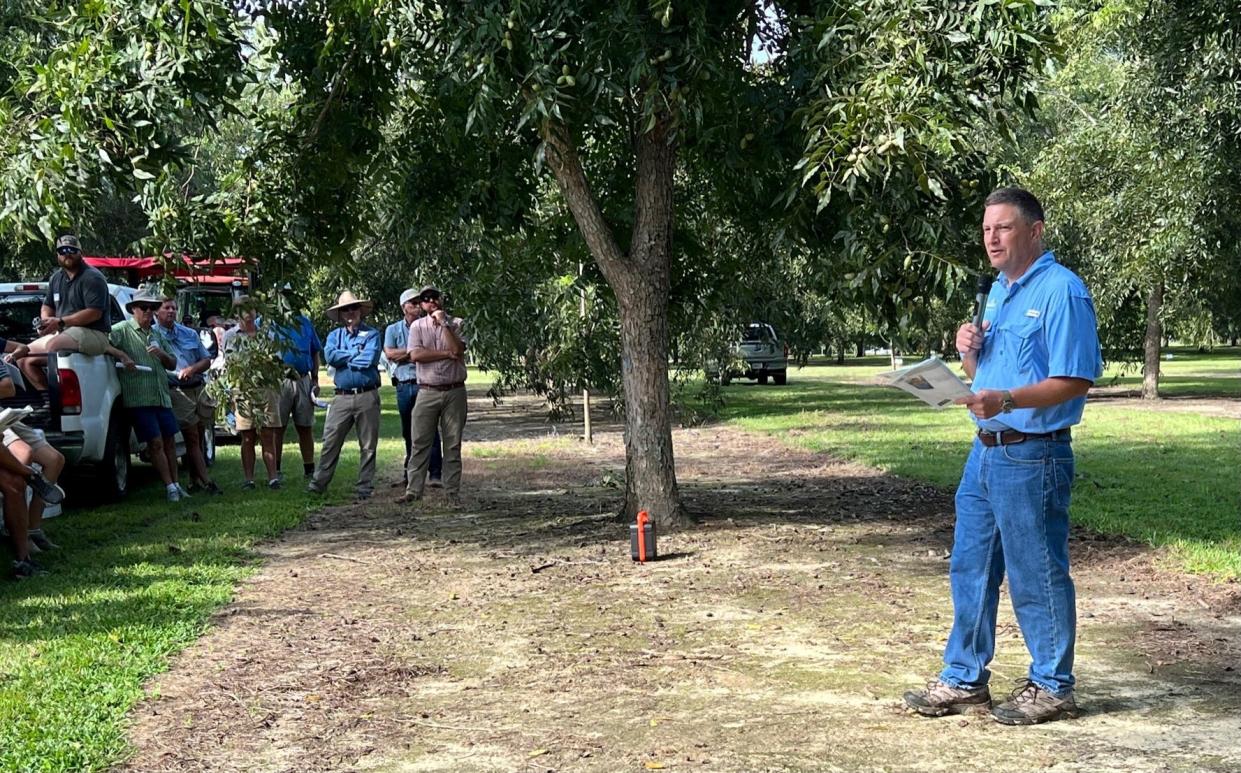It's National Pecan Day: Learn more about the nut that's so important to Georgia

Georgia is the largest pecan producing state in the nation, experts say. Making Georgia the right place to be for National Pecan Day.
“We produce somewhere around 100 million pounds annually,” said Lenny Wells, professor of horticulture and extension pecan specialist at the University of Georgia based in Tifton. “But we've been as high as 150 pounds. So we're the largest producer.”
An average pecan harvest in Georgia is about 88 million pounds, enough to make 176 million pecan pies, according to experts.
April 14 is National Pecan Day It was created by the Shellers Association in 1966 to recognize and honor the workforce behind the cultivation of pecans in America.
“Pecans are not native to Georgia,” said Wells. “The industry started here in the early 1900s. Pecans are actually native to Oaxaca, Mexico, up through the river systems of eastern central Texas, up into the Mississippi River Valley and its tributaries all the way up to Iowa. So it's got a really big native range.”

A nut that’s not a nut
“They're actually what’s called a drupe,” said Wells. “So we're actually eating the seed, not necessarily the fruit part. Tree nuts kind of have the fruit and seed all together. But with a drupe, you have a kind of fleshy fruit on the outside and the hard dry seed is on the inside. That’s the part that we eat.”
Pecans pack a health punch
“They make a really good snack," said Wells. “One of my favorite ways to eat them is roasted with olive oil. There are a lot of health benefits to eating pecans. Pecans are good for your heart. They're good for lowering your bad cholesterol. They have anti-inflammatory properties. They’re high in antioxidants.”
Pecans are a good source of calcium, magnesium, and potassium, which help lower blood pressure.
Pecan industry impacted by climate change
“One of the biggest impacts on the pecan industry ... related to climate change has been due to hurricanes,” said Wells. The effects on pecans have been considerable in the past. The severity of the storms that we get seem to be worse than they used to be. This caused us to adopt a management practice called hedge pruning.
“You prune the trees by cutting all the limb growth off that extends out beyond a certain distance from the trunk. Usually somewhere between 6 to 8 feet. Then we bring the height down between 30 to 40 feet just depending on the row spacing in the orchard. This creates a more compact tree.”
Wells said prior to adopting the new management practice of hedge pruning during September and October pecan tree limbs are loaded with pecans. Strong enough winds from a tropical storm would cause the weighed down branches to break easily.

Pam Knox, agricultural climatologist, director of the University of Georgia Weather Network said pecan growth can be impacted by temperature.
“Rising temperatures can cause quicker development in pecans,” said Knox. “Pecans also require a certain number of chill hours, so the warmer winters would reduce those but still leave them vulnerable to frost in spring. Since pecans are mostly irrigated, there would be less influence from changes in rainfall.
“Pecan farmers usually choose a variety of different pecans with slightly different temperature requirements so they can adjust to climate changes by picking the best varieties for warmer weather.”
Plenty of pecans in the trees
“There are over 1,000 different varieties of pecans,” said Wells. “But in Georgia, we only grow probably around 20 or so of those on a regular basis. A lot of the older varieties that you see in Georgia are the Stuart pecan tree, the Schley pecan tree and Desirable is another one. A lot of the older varieties are resistant to disease in the environmental conditions that we have here, which is hot and humid.”
Pecan disease
“That disease is called pecan scab,” said Wells. “It's a fungus that attacks the nuts and the leaves. The fungus will grow on the nut and if it happens early, it'll turn completely black and the nuts will fall off.
But if we have resistant varieties we don't have that problem. Some of the varieties that we now use that they do have good resistance are Avalon and Lakota pecan trees. And this allows us to grow the crop without having to spray fungicides to protect from that disease so much. And it's cheaper for the grower to do that.”
This reporting content is supported by a partnership with several funders and Journalism Funding Partners.
Erica Van Buren is the climate change reporter for The Augusta Chronicle, part of the USA TODAY Network. Connect with her at EVanBuren@gannett.com or on X: @EricaVanBuren32.
This article originally appeared on Augusta Chronicle: Georgia offers 20 different variety of pecans in time for Pecan Day

